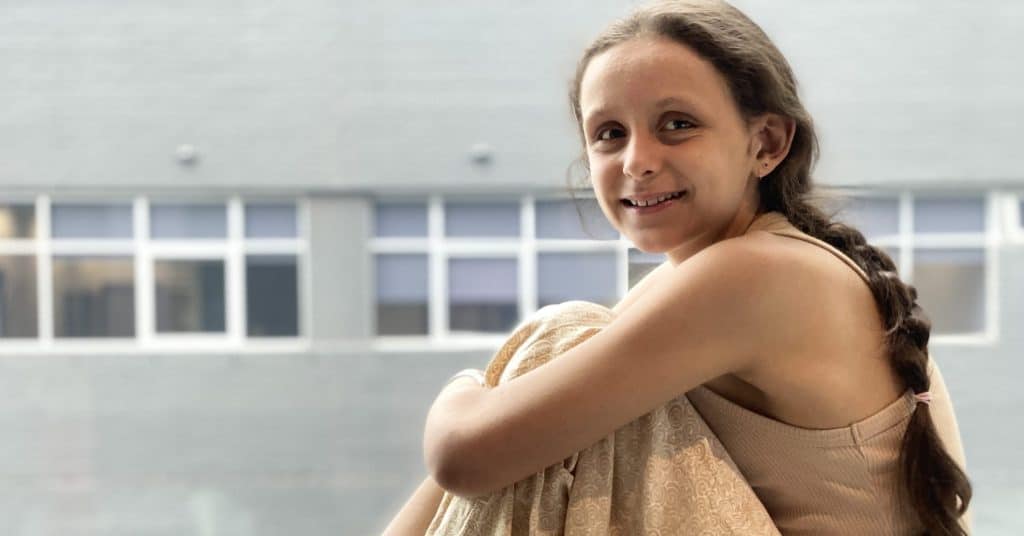Article from 2022 Impact of Giving Annual Report
Whether it’s a new treatment for childhood cancer, a vaccine to prevent pneumonia, or a device to help cerebral palsy patients, clinical trials are vital for the treatment and care of patients right across the RCH.
The ability to take part in, and often lead, national and international clinical trials allows patients at the hospital access to ground-breaking treatment initiatives. Clinical trials can assess the efficacy of new drugs, medical devices and approaches to surgery, evaluate new diagnostic or screening programs, and test new ways to prevent diseases, including medicines and vaccines.
The RCH Foundation has been funding the Melbourne Children’s Trials Centre (MCTC) since its inception in 2015 and, in that time, MCTC has grown from one nurse facilitating trials to a team of over 30. The number of trials undertaken in this time has more than doubled, as has the number of children involved in trials, which continues to increase each year. The state of the art trials centre is a unique collaboration between the RCH, MCRI and The University of Melbourne Department of Paediatrics, bringing together expertise in research, clinical practice and education.
Professor Andrew Davidson has been at the helm of MCTC since the beginning and says the centre continues to advance and innovate care at the RCH, providing children with access to life changing treatment that they otherwise wouldn’t have had access to.
“Clinical trials are the last step of rigorous research testing that a new treatment, device or prevention must go through before it’s approved for everyday use. For some children and their families, clinical trials mean giving patients that extra hope when other options are limited. They can be life changing; clinical trials are at the forefront of medicine,” said Andrew.
MCTC recently facilitated a clinical gene therapy trial to try to extend and improve the lives of children with spinal muscular atrophy (SMA), which is a rare genetic disorder that affects the part of the nervous system that controls muscle movement. The treatment involves using gene therapy to deliver the missing gene that causes SMA to appear in an infant’s cells. In July 2021, the RCH treated its first SMA patient with this gene therapy.
“With this treatment the child has a one-off dose which could potentially cure an otherwise lethal condition. Usually a child with SMA dies very young. It’s still very early days, but with this new therapy children are now walking and much closer to typical development,” said Andrew.
Clinical trials for rare or difficult to treat conditions have increased rapidly over the past five years. With more of these trials and gene therapies on the horizon, MCTC is leading the way in adopting gene therapy technology.
“With adults, health priorities are often dominated by common conditions such as hypertension or cardiovascular disease, whereas with children there are a lot of rare diseases such as metabolic disease or rare neurological diseases. Logistically, trials for rare or uncommon conditions can be hard to run as it’s difficult to get the upfront infrastructure like the patients, staff and coordinators, if you are only recruiting a few patients a year. With the trials centre, and ongoing RCH Foundation support, we are able to pool together resources to ensure these trials are actually run,”said Andrew.
“Trials in children with rare or complex conditions may have low numbers but these trials are often the most valuable as they may be the only hope of finding treatment options. In the past, these patients may have had to go overseas for treatment, or they don’t get it at all.”
For patients like Charlotte, who suffers from Progressive Familial Intrahepatic Cholestasis, a rare liver condition, the clinical trial offers her and her family the first real hope of a successful treatment to help with the incessant itching, weight loss and sleeplessness that goes along with her condition.

Charlotte is participating in an international medication trial which involves just three children in Australia and 120 worldwide. If the medication is successful in treating her symptoms it will be life changing for her and will mean she can live as close to a normal life as possible.
With up to 70 trials running at any one time, MCTC not only supports industry sponsored trials, but also trials where local investigators are leading the trials. These trials put MCTC at the forefront of generating translational research, which changes the way children are treated worldwide. To do this more effectively, MCTC has embraced theuse of innovative trial design and is leading the way with the adoption of new clinical trial technologies.
“MCTC is the first site in Australia to embed trials completely into the RCH’s EMR, which greatly improves the efficiency and cost-effectiveness of undertaking research,” said Andrew.
“MCTC is also utilising adaptive trials. This means the study can change as the trial goes along, depending on the outcome, and can make the trial more cost efficient, take less time and may require fewer participants.”
Andrew is emphatic when he says the MCTC would not exist withoutthe funding support provided by the RCH Foundation.
“No paediatric trials centre in the world operates without philanthropic funding, so the funding we receive from the RCH Foundation is absolutely crucial,” said Andrew.
“Not only does the funding help to provide the infrastructure to run successful trials, it also helps fund the initial study design process. As government and grant funding is so competitive, you need to have an absolutely top-notch idea to get these competitive grants. The RCH Foundation provides the seed funding so researchers and clinicians are able to get their research idea and study design to that level.”